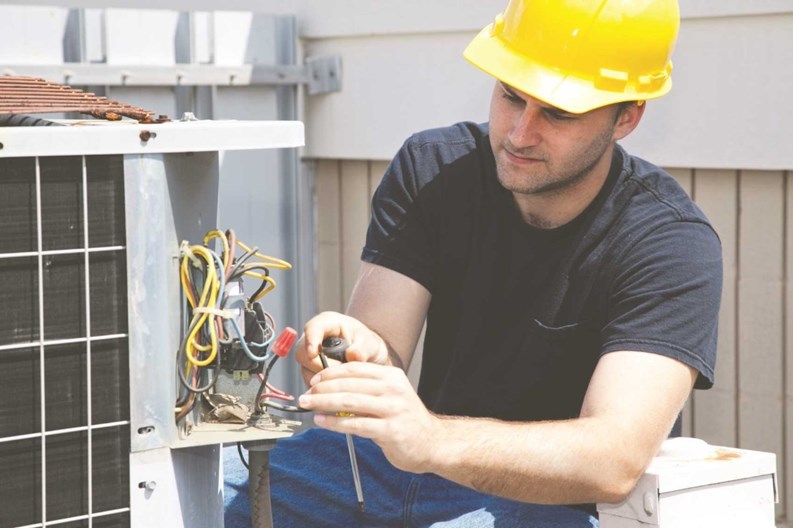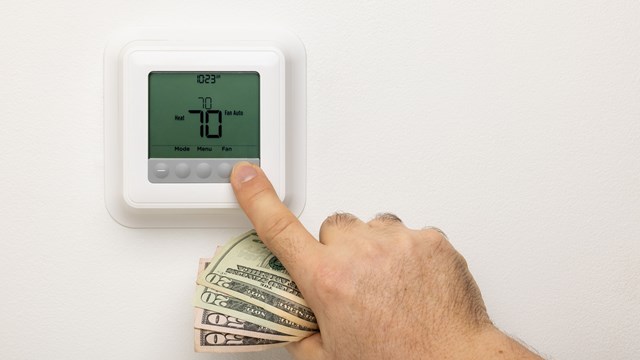With harsh winters and blistering hot summers, those living in New Jersey co-ops, condos and HOAs understand the importance of properly working heating, ventilation, and air conditioning (HVAC) systems.
That’s why it’s important for managers and residents to know who is responsible for what and how to properly maintain these systems, which could be a single heating/cooling system for the entire building or individual furnace or cooling systems in each unit. After all, in residences such as large high-rise buildings or townhome communities, a variety of HVAC technologies can be found. HVAC is the umbrella term for the system that includes all the equipment used to ventilate, heat and cool the building, move the air through the ductwork, and have that air filtered and clean for the occupants.
Proper Care
The basic components of an HVAC system are an outdoor air intake, mixed-air and outdoor air controls, an air filter, heating and cooling coils, humidification or de-humidification equipment, supply fans, ducts, a terminal device, a return air system, exhaust or relief fans, self-contained heating and cooling units, a control panel, the boiler, water chiller and cooling tower.
Doug Wong, manager at BC Express Inc. in Toms River, says that for New Jersey condos the most common HVAC system is a gas furnace with regular central air. Larger high rise residences may turn to a water-cooled or chiller boiler system, which combines the chiller, boiler, pumps and controls into a single package for simple installation and maintenance. A water-cooled system has a cooling tower which cools water that serves all units in a building, rather than each unit having its own. He adds that window AC units still exist but they are falling out of preference because they are noisy and not the most efficient.
“It's kind of the same as your car—if you don't check the oil and get a tune up on it, you run the risk of it creating a lot more wear and tear on the system and it does not run as efficiently,” says Kim Leary of Bill Leary Air Conditioning and Heating in Metuchen. “If you think about your air conditioning and heating system like a car, you only use a car a few hours out of the day but your air conditioning and heating system goes 24/7 so it needs more attention because of the work load that it has. It is definitely something that you want to stay on top of.”
Many industry professionals will agree that checking and changing of the unit filter is a key step in ensuring the health and longevity of your HVAC system.
“Most air conditioning products should have the filter cleaned on a regular schedule based on unit usage, pets, et cetera,” says Richard Nuss, vice president at Islandaire, an national air conditioning and heating manufacturer based in East Setauket, New York. “Without proper airflow any product will not function properly as designed and could decrease the life of the unit and create future repairs that could have easily been avoided.”
Nuss recommends that buildings and unit owners clean their filter at least four times a year and an annual spring check up of the unit, coils, wall sleeve and other accessories, “to make sure the unit will operate properly for the cooling season,” he says.
In addition to filters, there are a few things that professionals and facilities managers should monitor. Wong says that it is important to ensure that, “motors are amping properly and all burners are burning properly and both pieces of machinery are clean. You want to make sure that the furnace is burning properly, the flame is right and everything is calibrated accurately and there are no health and safety issues. He adds that these suggestions are general and maintenance should be performed according to manufacturer specifications.
According to Michael Vinick, president of Duct & Vent Cleaning of America, and a board member of the National Air Duct Cleaners Association (NADCA), every time the furnace or air conditioner is in operation, dust, dirt particles, debris, pollen, pet dander and other pollutants are drawn into the duct system and must be cleaned.
No matter how simple or complex a system, Wong recommends a monthly check up to ensure all components are in working order and no part has been worn or damaged. He suggests to make sure the filter and outside unit are clean and able to function without
“A lot of times we walk into a utility room and we see that everything is packed in and we cannot even get through to service the unit. You want to make sure nothing is obstructing the unit,” he says.
Green Options
With today’s environmentally-friendly way of thinking, a number of HVAC green/energy innovations are finding their ways into New Jersey.
Nuss says that his company offers wall-mounted, motion-detecting thermostats that can bring down heating and cooling costs for residents. The device is equipped with standard motion sensors and door sensors that turn off the HVAC unit when the space is not occupied.
Wong says that new furnaces are much more efficient than the older ones. The federal mandate is that all furnaces have to operate at what he calls 92 percent or higher level, meaning 92 percent of the heat is coming into the unit and eight percent is coming out the fluid pipe. He says that this is much more efficient than older furnaces, most of which operate at only 80/20 percent.
Other co-gen technologies include micro-turbines and fuel cells. By making continuous use of both electricity and thermal energy, condominium residents can save up to 35 percent on overall energy costs.
Also slowly coming into play are the addition of photovoltaic panels, a method of generating electric power by converting solar radiation into direct-current electricity using semiconductors that exhibit the photovoltaic effect. The direct current is converted into alternating current and connected to the building electrical distribution system.
Leary adds that there are ultraviolet lights available for duct systems. They help mitigate the bacteria and debris that get stuck and obstruct airflow.
The state of New Jersey offer numerous rebates and loan subsidies for buildings and homeowners that retrofit their home with more efficient and energy -saving equipment says Wong. Information on specific offers can be found at: http://www.njcleanenergy.com/main/rebates-and-promotions/rebates-and-promotions .
Since the life expectancy of an HVAC system is approximately 20 to 30 years, maintaining it correctly should have it working up to and possibly beyond those years. Without proper maintenance, breakdowns will occur and you may be looking at a full system replacement years earlier than expected. So stay ahead of breakdowns by doing repairs and cleanings at the proper times.
Keith Loria is a freelance writer and a frequent contributor to the New Jersey Cooperator. Editorial Assistant Maggie Puniewska contributed to this article.







Leave a Comment